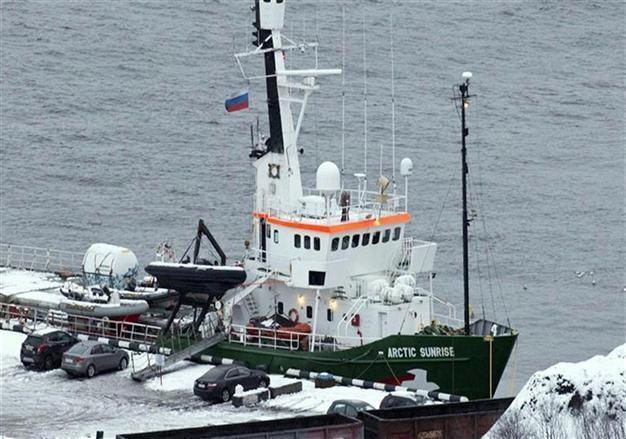Russia to boycott maritime court hearings over Greenpeace ship
MOSCOW - Agence France-Presse

A handout picture taken on October 20, 2013, and released by Greenpeace International shows Greenpeace's Arctic Sunrise ship moored in the northern Russian city of Murmansk. AFP PHOTO / GREENPEACE / DMITRI SHAROMOV
Russia said Oct. 23 it will boycott maritime court hearings sought by the Netherlands over the fate of 30 crew members of a Greenpeace ship who were detained during a protest against Arctic oil drilling.
The announcement marks another step in an escalating feud between the two close economic partners that has also witnessed the brief detention of a Russian diplomat in The Hague and Moscow's threat to ban some Dutch imports.
The Russian foreign ministry said Moscow "has informed the Netherlands and the International Tribunal for the Law of the Sea... that it does not intend to take part in the tribunal's hearings".
It added that Russia "remains open to settling the arising situation" without specifying what future negotiations it intended to pursue.
The flare-up between the two states whose friendship dates back to Tsar Peter the Great's visits to learn the shipbuilding trade in the Netherlands is particularly embarrassing coming during a Russian-Dutch Bilateral Year aimed at promoting cultural ties.
The Netherlands said Monday it had taken Russia to the world's maritime court over the fate of the Dutch-flagged ship and its crew.
Russian authorities have charged the environmental group's members with piracy -- which carries a punishment of up to 15 years in prison -- after they staged an open-sea protest in September against oil drilling by the state-owned energy giant Gazprom.
The activists from 18 countries have been placed in pre-trial detention until November 24 in the northern Russian region of Murmansk.
The Dutch government said it expected a hearing to be held within the next two to three weeks before the Hamburg-based tribunal.
That legal action is the second step in the Dutch government's attempts to have the Greenpeace activists released.
The Netherlands has also started legal proceedings against Russia in the form of an arbitration process.
The Russian foreign ministry said Wednesday that Moscow had also informed The Hague "it does not accept" rulings issued by the arbitration court because they may contravene the country's federal laws.
The court was established by the United Nations in order to help settle maritime disputes between states.
The diplomatic row has already threatened to impact close economic and trade ties between the two sides.
A top Russia health official warned on October 9 that Moscow may ban the import of Dutch tulips and dairy products because of undisclosed consumer safety concerns.
Russia has often been accused of using trade as a diplomatic weapon and has previously halted food imports from both the European Union and former Soviet nations seeking closer relations with the West.
Tensions increased when police in the Hague detained a Russian diplomat over accusations he was mistreating his children. The Netherlands later apologised for breaching the Vienna Convention on Diplomatic Relations.
The escalation continued on October 15 when a senior Dutch diplomat at the Netherlands embassy in Moscow was beaten up at his home in the Russian capital by unknown individuals who scrawled a message supporting gay rights on a mirror.
The Russian foreign ministry expressed regret over the "sad incident" and said that security forces were doing everything to detain the individuals behind the attack.
No breakthrough has yet been reported in the criminal case.
Officials in The Hague stressed the tensions will not affect plans by Dutch King Willem-Alexander and his wife Maxima to visit Moscow on November 9 to mark the end of the Russian-Dutch year.
The Dutch king is also expected to conduct talks with Russian President Vladimir Putin.
